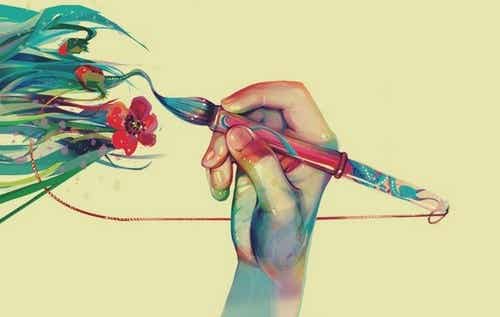The conflicting feelings are the result of the emotional and affective ambivalence we feel towards certain situations or people. Can we really feel love and hate at the same time? How to get out of such a situation? What does science say about it?

Last update: February 03, 2021
As he said British lawyer George Carman, "Mixed feelings are like a mixture of drinks, a mess to the soul." Ambivalence and contradiction are within the emotional range of normality. Who hasn't happened to feel opposite emotions towards someone or to find themselves overwhelmed by doubts?
It is not necessary to be in a particularly turbulent time to feel love and hate or attraction and rejection towards someone. These situations occur in many people's lives and are part of the nature of our psyche.
The mind is not a perfect contraption, but this does not mean that we should surrender to the fact of experiencing this contradiction. How to get out of this vicious circle? What are mixed feelings really?
What are mixed feelings?
Mixed feelings, also called conflicting feelings, they manifest themselves in each of us at different moments in life and are apparently contradictory. That is to say, they are opposing feelings directed towards the same object or situation. An easy to understand example: feeling love and hate towards someone at the same time.
It is a paradox of emotional coexistence that can cause severe discomfort, as well as an internal conflict. In the words of Freud himself (1926), whoever is a prisoner of conflicting feelings "feels a well-founded love and a justified hatred towards the same person ".
However, mixed feelings not only include love and hate (although this is generally the case), but also attraction, repulsion, affection, respect, disgust, anger, indifference, etc. As we know, the emotional range is very wide and every emotion is full of nuances.
"Doubt can provoke mixed emotions in us."
-Elissa Washuta-
Affective ambivalence
The term "ambivalence" in the emotional spectrum was first used by psychiatrist Eugen Bleuler (1910) to refer to “Those situations of psychic life in which opposite feelings coexist and of equal strength without being able to choose between one and the other ".
Thus, ambivalence is used to designate not only pathological situations, but also different aspects of non-pathological (ie “normal”) psychological life.
How to deal with mixed feelings?
Accepting and managing a situation where you have mixed feelings is not easy, especially if some of them are undesirable, such as the feeling of liberation we can experience when someone we have cared for for a long time dies.
The same confrontation between simultaneous feelings can generate frustration, anger, sadness, uncertainty, indecision and can make us feel unable to move forward (and not even have a faint idea of how to do it). What can we do?
- Accept that you have doubts and that it makes us human. Don't judge yourself, it's not negative; we all have doubts, fear and make mistakes.
- Try to stop and analyze what you feel deep inside. Give yourself time to think, to let your thoughts flow, and don't feel pressured when you have to make a decision. Try to find serenity again.
- To manage emotional ambivalence, it is essential to observe it from the outside, know it from the inside and finally understand it. Try to look at yourself from the outside: what would you say to another person if they were in the same situation as you?
- If, on the other hand, you continue to feel overwhelmed by this constant doubt between what to do and what not to do (and what you feel or not), you should consider the help of a specialist: psychotherapy is a good option to find the light along the way.
What does science say about it?
Various studies reveal that conflicting and contradictory feelings are not necessarily synonymous with indecision, but rather have to do with the emotional complexity of the human being.
This means that our emotional world is so rich that we feel emotions seemingly contradictory is not that difficult.
Ability to distinguish moods
A study (2016) conducted by researchers at the University of Waterloo, specifically by Grossmann, Huynh and Ellsworth, on a sample of 1.396 people from 16 different cultures studied these feelings in depth. The results obtained were surprising.
Participants had to indicate what emotions they felt in certain situations in their life (for example, following a problem with a family member, during illness or when they were overworked).
The study revealed that in Western culture we tend to think that conflicting feelings are negative or undesirable and we quickly connect them to indecision. However, those who have contradictory feelings can better distinguish their emotional states and to find a better balance in your life. Interesting, right?
Final reflections
Have you ever felt this way? How did you behave in these cases? We have presented some suggestions that could be useful in dealing with similar situations; in reality, there is no magic formula to get out of the emotional loop in which we can find ourselves.
However, it can help to become aware that we are complex beings, that each of us sometimes has doubts and that we often have to live with this emotional ambivalence that makes us unique.
Of course, if you feel that the situation is getting the better of you, don't hesitate to ask for help. Getting out of this vicious circle is possible, e all emotions have their reason for being: we learn from them, so let us try them; let's not fight them.


























